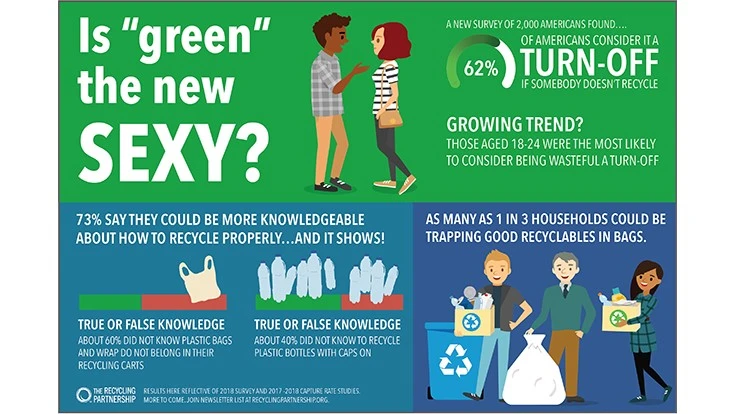
More than half (52 percent) of Americans feel they don’t have access to recycling, particularly young people and low-income families, but that’s not to say they don’t want to recycle.
According to The Recycling Partnership 2018 resident survey, 62 percent of people think it’s a “turn-off” if somebody doesn’t recycle.
The survey conducted in October by OnePoll on behalf of the Virginia-based nonprofit asked 2,000 residents what motivates them to recycle, what barriers they face and what they know about the topic.
“For me, I’m trying to design messaging that’s really addressing those motivations,” says Elizabeth Schussler, senior director of program design at The Recycling Partnership. “I call that ‘speaking to the listening.’ Really, I just want to get people’s attention. In such a busy world and with communities’ limited outreach budgets, that is a real challenge that clearly is contributing to misplaced recyclables.”
It is not just residents who need to get on the same page. All stakeholders play a part in improving their recycling programs, Schussler says.
Almost half of Americans (46 percent) feel that recycling properly proves to be quite difficult, but that could be because 73 percent say they could be more knowledgeable about how to recycle. When it comes to specifics, about 30 percent of people think garden hoses and tree lights are recyclable in their carts and about 40 percent think caps should be taken off plastic bottles.
“There’s definitely a gap in recycling knowledge,” Schussler says. “We’re on a quest to better understand where the gaps are and to better explain the role of recycling in the management of household waste. If you consider that every home has the power to keep 800 pounds of standard recyclables out of the landfill every year, you can see the need to clean up this cascading and cumulative responsibility.”
Raising residents’ confidence to accurately recycle will be a win-win for material recovery facilities (MRFs), communities and the environment, but there is work to be done.
The Recycling Partnership has spent the last three years focusing on understanding contamination and how to best combat it. Schussler recalls studies on capture rates in Atlanta, Denver and Chicago. While there are differences city to city, the organization found plastic bags in 8 out of 10 carts in Atlanta and Chicago and see about 1 in 3 households are trapping good recyclables by bagging them instead of recycling them loose in their carts.
“MRFs are being shut down every day to clean out the plastic bags from their equipment and those things don’t weigh much,” Schussler says. “When we looked at contamination in Chicago, food was the worst by weight, but plastic bags were the worst by occurrence. Now you must decide to first try to correct behavior to reduce the weight of contamination, or to reduce the negative impact of something like bags and tanglers, or perhaps to focus on capturing more of good recyclables tied up in bags.”
The survey is the first to come in an ongoing pursuit to understand how residents feel and what barriers we need to overcome to make recycling easier and cleaner.
“It’s the first temperature taking of a couple of issues,” Schussler says. “We are continually taking what we learn and creating smart behavior change tools for communities.”
Latest from Waste Today
- Quest Resource posts Q4 loss, names new CEO
- Indianapolis awards solid waste contract, updates recycling drop-off program
- Kent County, Michigan, highlights hazardous waste disposal programs
- Viably, Turmec partner on Ohio installation
- EPA plans to revisit numerous environmental, climate regulations
- Miami-Dade Innovation Authority launches fifth Public Innovation Challenge
- Fornnax wins Green Innovation of the Year award
- Louisiana city launches glass recycling program





